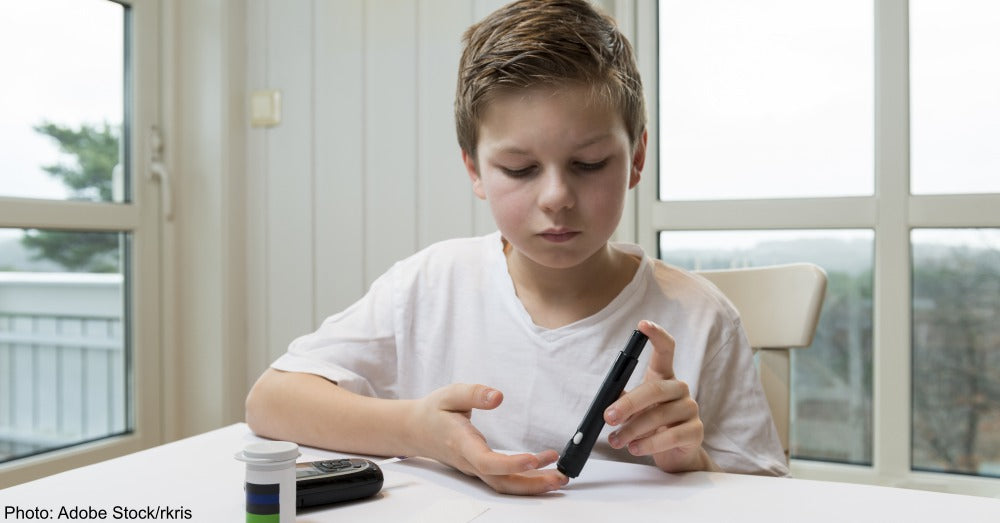Autism and Diabetes: What You Need to Know About Your Increased Risk
A. Stout
Autism and diabetes are two very different conditions. Autism Spectrum Disorder (ASD) is a complex neurological disorder characterized by social impairments, repetitive behaviors, and struggles with verbal and nonverbal communication. Diabetes, on the other hand, is a disease in which the immune system either kills off insulin-producing cells (type 1) or the body becomes resistant to insulin (type 2).
But could these two very different conditions be somehow connected? Research is beginning to indicate that the answer to that question is "yes." And while there are certainly challenges that come from having both of them at the same time, there are ways in which autism can actually make certain aspects of diabetes management easier.
Autism and Diabetes: The Link
 Photo: Adobe Stock/rkris
Photo: Adobe Stock/rkrisRecent research ventures have found that individuals with autism have an increased risk of developing type 2 diabetes. The largest study to date that investigated this link took place in Taiwan and was published in 2016.
Between the years 2002 and 2009, The researchers examined 30,610 people total, all of whom were ages 10 to 29. 6,122 of them had ASD and not diabetes, whereas the remaining 24,488 had neither condition and served as controls for the study.
In 2011, researchers evaluated their data to see how many people had developed type 2 diabetes and whether there appeared to be an increased rate in one group or the other.
It turned out that 1.6 percent of the autistic population developed type 2 diabetes, whereas the rate for the control group was a mere 0.4 percent. In other words, autistic people were at significantly higher risk of type 2 than neurotypical (non-autistic) people.
Reasons for Increased Risk
So why the increased rates? There are likely several factors at play.
1. Weight
While obesity is certainly not the only factor behind developing type 2 diabetes, it is still a strong and well-known one. More people with autism experience weight issues than their neurotypical peers, putting them at risk for type 2 diabetes. Estimates indicate that 32 percent of autistic kids are overweight, versus 23 percent of neurotypical kids. Additionally, 16 percent of autistic kids are obese, whereas only 10 percent of their typical peers also experience this problem. This may be due to medication, picky eating, and genetic factors linked to both autism and weight issues, like deletions on chromosome 16.
 Photo: Adobe Stock/Rostislav Sedlacek
Photo: Adobe Stock/Rostislav Sedlacek2. Medication Use
There are only two types of medications that are currently approved by the FDA in treating some of autism's challenges: antipsychotics risperidone and aripiprazole, which are known to lead to weight gain. In fact, the aforementioned study from Taiwan suggested that the people prescribed these drugs had a twofold increased risk of developing type 2 diabetes.
3. Genetic Factors
Even when researchers in the Taiwanese study controlled for potentially confounding variables like weight and medication use, those with autism were still three times as likely to develop type 2 diabetes. This indicates that there are likely some genetic components at play.
For example, it is known that women with gestational or type 2 diabetes during pregnancy have a higher chance of giving birth to an autistic child and/or a child who goes on to develop type 2 diabetes at some point. There also exists a gene, GL01, that is implicated in both type 2 diabetes and autism.
4. Lack of Access to Medical Care
Some research indicates that adults with autism are also at higher risk of type 2 diabetes and other conditions, presumably due to a lack of access to preventative medical care. That is, after all, a huge issue in the autism community.
Life with Diabetes and Autism
As those who know an autistic person or are an autistic person could probably guess, the two conditions definitely affect each other.
But not always in a bad way.
 Photo: Adobe Stock/Dmytro Panchenko
Photo: Adobe Stock/Dmytro PanchenkoIn fact, those who are both autistic and diabetic may have some unique advantages over neurotypical diabetics. For many individuals on the autism spectrum, routine is absolutely essential, and change is extremely upsetting to the point where autistics tend to be very rigid about their schedules and habits. Practicing good diabetes management techniques like monitoring blood sugar, taking medications, exercising, and eating a certain way can potentially become part of an autistic person's daily routine. And that can help them to keep up with it.
But of course, autism can also pose unique challenges for those who have diabetes. Many autistic people are very picky eaters, consuming only a few different foods (and it's more complicated than "They'll eat when they're hungry.") As you can imagine, this has the potential to be a huge problem, especially if the individual's select few foods are not diabetes-friendly.
And while need for routine and aversion to change definitely has its upsides, it also has its downsides, too, because the individual has to change their already-established routine once they get a diabetes diagnosis. Many people with autism also have trouble with day-to-day self-care tasks, so management may require help and prompting.
In addition to that, many autistic individuals also struggle with high levels of stress and anxiety, which can negatively influence blood glucose levels. As one autism mom said, "You cannot create proper insulin-to-carb ratios when the underlying cause of the spike is stress, not carbs."
The communication deficits inherent to autism can also pose a problem, especially when it comes to reporting how an autistic patient's body feels. Trouble with this kind of communication can make collaboration with doctors and caregivers difficult.
All in all, having autism alongside diabetes can have its perks, but it can also be a big challenge. If you or a loved one is struggling to manage both at the same time, please consult a doctor or trained therapist for guidance.


